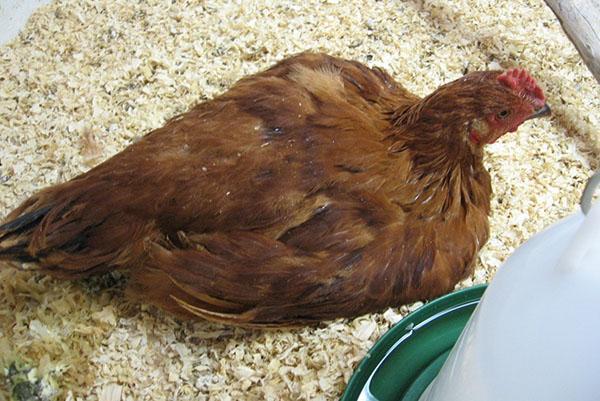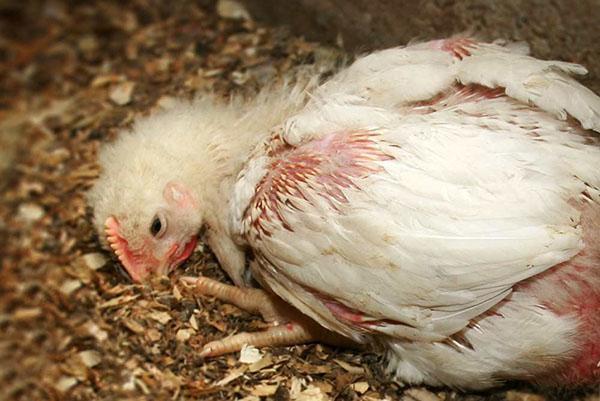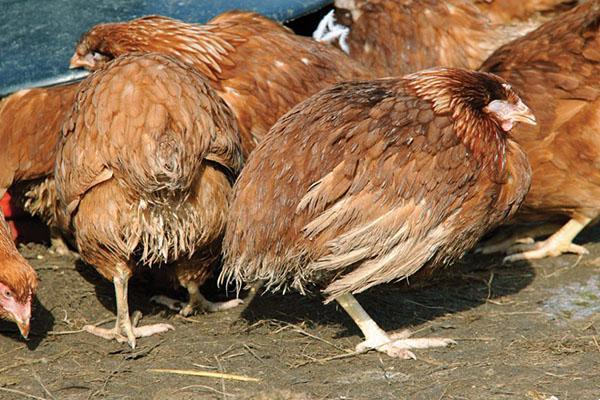Learning to treat coccidiosis in chickens on our own
 Young poultry is exposed to many hazards. One of the most serious diseases is coccidiosis in chickens, treatment at home of which requires a lot of diligence, patience and attention from the poultry farmer. How is this disease manifested, what are its symptoms and methods of treatment?
Young poultry is exposed to many hazards. One of the most serious diseases is coccidiosis in chickens, treatment at home of which requires a lot of diligence, patience and attention from the poultry farmer. How is this disease manifested, what are its symptoms and methods of treatment?
Causes and signs of coccidiosis in chickens
The causative agents of the disease are eleven varieties of the simplest microorganisms, the penetration of which into the body causes similar, in most cases, severe consequences.
Oocysts of coccidiosis pathogens in chickens infect the body by entering it with contaminated water and food, from the litter in the poultry house or from the soil. While developing, microorganisms begin to multiply, and new batches of oocysts, after four days with droppings, enter the external environment.

Coccidiosis in chickens occurs in an acute or chronic form, and both growing young and adult birds are susceptible to the disease.
The disease affects the mucous membranes of the gastrointestinal tract, causing them to irritate, disrupt the integrity and weaken the bird. The disease is accompanied by diarrhea in chickens, which should be treated systemically. Otherwise, the affected tissues turn into easy prey for other types of pathogenic microflora that cause secondary infections.
 If the number of pathogens that have entered the body is small, the disease is blurred. Chicks often recover, acquiring immunity to coccidiosis, but for about a year they remain carriers and disseminators of the infection. The acute form threatens with a sharp deterioration in the condition of birds, their weakening due to digestive disorders, exhaustion and death.
If the number of pathogens that have entered the body is small, the disease is blurred. Chicks often recover, acquiring immunity to coccidiosis, but for about a year they remain carriers and disseminators of the infection. The acute form threatens with a sharp deterioration in the condition of birds, their weakening due to digestive disorders, exhaustion and death.
Symptoms of coccidiosis in chickens
 Coccidiosis in chickens is difficult to detect in the early stages. The poultry farmer may suspect something was wrong, only noticing in pets:
Coccidiosis in chickens is difficult to detect in the early stages. The poultry farmer may suspect something was wrong, only noticing in pets:
- unusual sleepiness;
- lethargy, apathy;
- lack of appetite;
- loss of tone and color in earrings and tuft;
- signs of blue on the skin near the eyes;
- constant disheveledness;
- untidiness, expressed in constantly dirty plumage near the cloaca.
At later stages, it becomes noticeable that the chick's goiter is drawn and filled with liquid, and the droppings take on the appearance of liquid, with traces of blood and foam. Partial paralysis or a wobbly, unsteady gait are not excluded. In beef chicks, the symptom may be an increase in feed intake without weight gain.
Without treatment, diarrhea in chickens and other signs of coccidiosis increase, leading to the death of the bird in 4-7 days.
Treatment of coccidiosis in chickens
The use of only symptomatic treatment of coccidiosis in chickens does not give a complete recovery. Therefore, specialized drugs are used, for example, furazolidone, furacilin and norsulfazole. To date, there are funds aimed at the destruction and removal of the causative agents of coccidiosis from the body.
 For the prevention and successful treatment of coccidiosis in chickens at home, Coccidrodin is used, which acts directly on pathogenic microorganisms and deprives them of their ability to harm birds. The medicine is intended for young animals and chickens and is given with water for two days.
For the prevention and successful treatment of coccidiosis in chickens at home, Coccidrodin is used, which acts directly on pathogenic microorganisms and deprives them of their ability to harm birds. The medicine is intended for young animals and chickens and is given with water for two days.
The same accelerated, but very effective course is provided for the treatment of chickens with Baycox, according to the instructions, the agent can be used for prevention, as well as again in case of relapses of the disease.
Instructions for use for chickens Amprolium hydrochloride says that the drug is harmful to the causative agents of coccidiosis and is suitable for the treatment of not only juveniles, but also breeding adult livestock. Amprolium is given with drink or feed and is withdrawn five days before slaughter.
 Together with feed, chickens and young broiler breeds are given another effective remedy for coccidiosis - Avatek 15%. The bird should receive medication from the first days of anxiety symptoms until 4 months of age. Four days before slaughter broilers the drug is canceled.
Together with feed, chickens and young broiler breeds are given another effective remedy for coccidiosis - Avatek 15%. The bird should receive medication from the first days of anxiety symptoms until 4 months of age. Four days before slaughter broilers the drug is canceled.
Treatment of coccidiosis in chickens is carried out until the full recovery of the livestock, while one should not forget about preventive measures.
Preventive measures against coccidiosis in chickens
The causative agents of the disease can easily tolerate fluctuations in temperature and humidity, remaining active and dangerous for a long time. Therefore, as a preventive measure against coccidiosis in chickens, they carry out regular treatment of inventory and premises with antiseptics, and refractory surfaces with a blowtorch.
If signs of coccidiosis are detected in chickens, treatment at home is carried out with isolation from the rest of the population of infected poultry.
 On an ongoing basis, you should:
On an ongoing basis, you should:
- change the litter;
- monitor the cleanliness of drinkers and feeders;
- prevent the accumulation of droppings and soil in the poultry house;
- vaccinate an egg herd;
- separate chickens and chickens of different ages.
It is extremely important not to allow crowded content, leading to early infection and severe consequences from the spread of coccidiosis and other diseases of chickens.